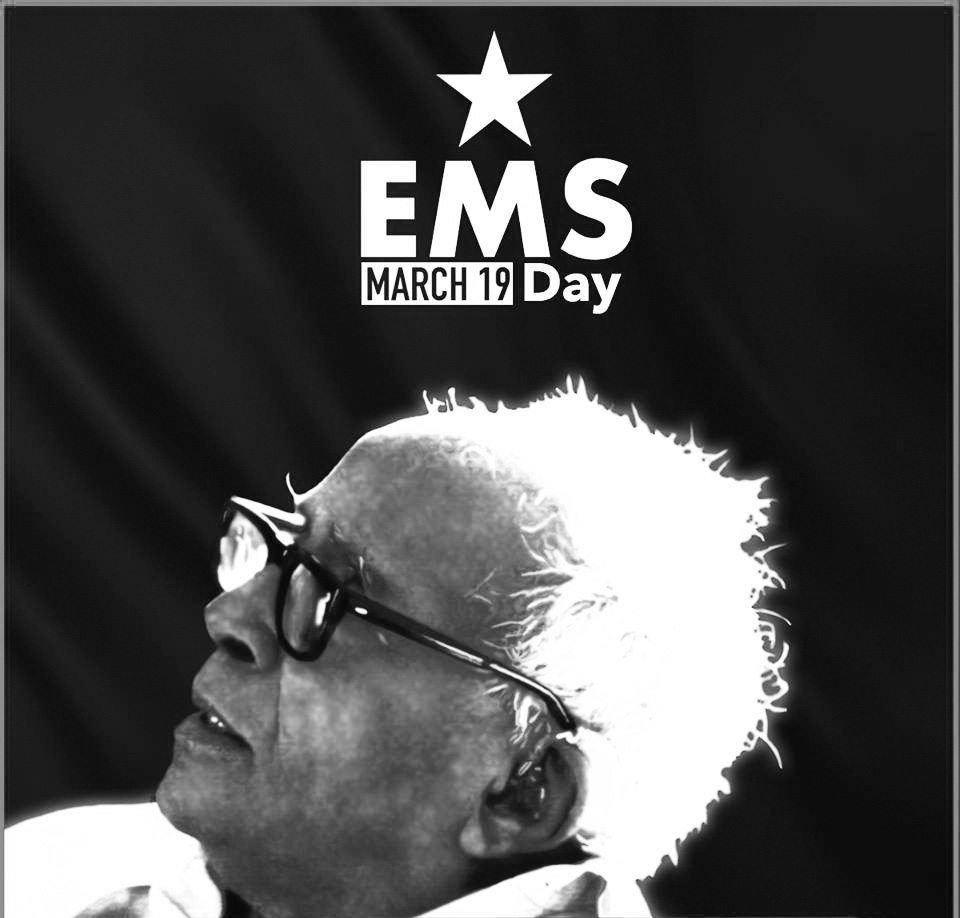
CPI(M) Remembers Comrade EMS Namboodiripad
COMRADE EMS Namboodiripad was one of the foremost leaders of the Communist movement in India and one of the founding leaders of the Communist Party of India (Marxist).
In his nearly seven decades of public life and revolutionary activities, EMS Namboodiripad left an indelible imprint on the progressive and working class movement of the country. As a young man, he became active in the social reform movement against caste. He left college in 1931 to join the freedom struggle and was jailed in the satyagraha movement. From then onwards, he played an important role in the Congress movement and was one of the founders of the Congress Socialist Party in Kerala. In 1934 he became the all India joint secretary of the Congress Socialist Party. It is in this period that EMS while leading the Congress Party as general secretary of the Kerala Pradesh Congress Party became acquainted with Marxism. He was one of the five members who formed the founding group of the Communist Party in Kerala in 1936. EMS Namboodiripad represented the coming together of the two streams, the anti-imperialist and the anti-feudal struggles, which laid the foundations for the development of a powerful communist movement in Kerala. He was one of the key proponents of Aikya Kerala which led to the formation of Kerala as a unified linguistic state.
EMS Namboodiripad was first elected to the Madras Provincial Legislative Assembly in 1939. As an important leader of the fledgling Communist Party he donated the proceeds of his landed property to the Party. He went underground building the Party in crucial periods between 1939-42 and 1948-50. He was elected to the Central Committee of the Communist Party of India in 1941. He became a member of the Polit Bureau of the CPI in December 1950 and later its secretariat. He became general secretary of the united CPI in 1962.
In 1957, after the state of Kerala was formed in the first elections in 1957, the Communist Party won a majority and EMS Namboodiripad became chief minister of the first elected Communist ministry in India. It was the EMS ministry which initiated the path breaking land reform legislation and other democratic measures, till the ministry was dismissed undemocratically in 1959. EMS Namboodiripad became chief minister of Kerala again in 1967 heading a United Front ministry till 1969.
EMS joined the leading group from the united Party who formed the CPI(M) and was elected to the Central Committee and the Polit Bureau of the Party at the Seventh Congress of the Party in 1964 and he continued to serve in these positions till his death.
EMS Namboodiripad was elected the general secretary of Central Committee of the Communist Party of India (Marxist) in 1977 and he led the Party in this capacity till the 14th Congress in 1992 when he stepped down due to ill-health. His leadership in rallying all the Left, democratic and secular forces was invaluable.
EMS was a brilliant Marxist theoretician. He made outstanding contributions to the application of Marxism-Leninism to Indian society and in working out the strategy and tactics of the Indian revolution. His vast body of writings bears the mark of an original and creative mind which mastered the dialectics of Marxist theory. His writings on land relations, Kerala, society and politics and his writings on Marxist philosophy, literature and history – mark him out to be one of the most influential communist thinkers of the country and the world.
EMS Namboodiripad was a rare example of a Communist leader who hailing from a traditional landlord family graduated to become the foremost leader of the proletarian revolutionary movement. He spent three years in jail and six years underground. His was a life of sacrifice and simplicity. He set an example which has inspired tens of thousands of communists all over the country. In Kerala he was a legend in his lifetime who was adored and respected by all sections of the people. Till the last day of his life, despite failing health, EMS kept to his daily routine of writing articles and providing guidance to the Party.
He died on March 19, 1998 at the age of 89.


